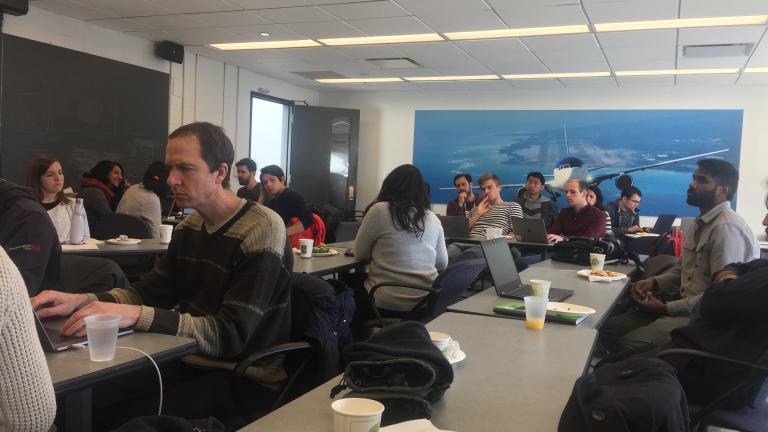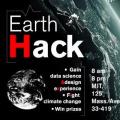
The second annual EarthHack event brought together 30 people committed to mitigating climate change to work for a full day to develop quick, actionable insights using data and design. Held at MIT, the mini hackathon was hosted by the EarthSpeaks team from the Human Systems Lab and sponsored by the MIT Portugal program. Participants came together from MIT, Harvard, Georgetown, the Parsons School of Design, Columbia, the Rhode Island School of Design, and the Knight Science Journalism Fellowship. Participants broke into two teams for the day: those focused on data and those focused on design. The data group was assisted by Dr. Cait Crawford, a Distinguished Engineer at IBM who specializes in using data and code to solve societal problems such as maternal deaths in childbirth. The design group was assisted by Gui Trotti, an architect and industrial designer with expertise in designing for extreme environments.
The mini hackathon ran from 8 a.m. to 8 p.m. Participants took a break from working sessions to hear from retired astronaut Dr. Cady Coleman and glass artist Josh Simpson. Dr. Coleman talked about how her experience working with astronauts from other countries taught her how to work better in teams, a skill that was key for the hackathon participants as they formed teams to tackle the problem of climate change. Simpson shared stories about his career as an artist, highlighting his passion for making miniature worlds inside glass globes.
At the end of the day, six teams presented their ideas for mitigating climate change. The judges voted on the presentations and selected the top three teams:
•First place went to a team from the MIT/Woods Hole Oceanographic Institution Joint Program (MIT-WHOI) who were joined by a student in MIT's Operations Research Center (ORC). This team consisted of Joleen Heiderich, Julie Jakobski, Sam Levang, and Sebastian Essink of MIT-WHOI, as well as Angi Orfanoudaki of ORC. They advanced interpretable AI for climate disasters, creating a prototype of an app that would allow a user to input their country and year and return mortality risk and contributing factors, all based on climate data.
•Second place went to a team from the MIT Sea Grant who were joined by a student from Harvard's Graduate School of Design (GSD). This team consisted of Ben Bray, Dr. Luca Bonfiglio, José del Águila Ferrandis, and Ellery Rajagopal of Sea Grant as well as Vaishnavi Magar of GSD; the group built on research being done by the MIT Sea Grant. They worked on modeling and understanding ocean temperature using machine learning, where a major challenge is that the trends in temperature change over time, making it difficult to predict future temperatures.
•Third place went to a team named One Small Step, which consisted of Deepa Rao, Craig McLean, Caroline Rozendo, and Gabriel Pereira of MIT as well as Ada Shaw of Harvard. They worked on developing a survey that would aggregate a user's lifestyle choices and contextualize it against statewide averages to increase awareness about how peoples' lifestyle impacts climate.
The prizes awarded were $250, $150, and $100 respectively.
The event built upon the existing community engaged in the conversation about climate change. The EarthSpeaks team will stay in touch with their new contacts and look forward to working together to mitigate climate change.





